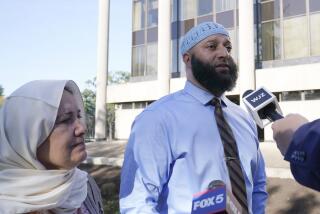Supreme Court decision allows early release of former Mongols biker in pipe bomb case

SAN DIEGO — By the time Richard Glen Mathews maimed an Imperial Beach man with a pipe bomb in May 1991, he’d already shot at least three people during his lifetime.
He was cleared the first time he killed someone when it was ruled self-defense. The second time, he was convicted of first-degree murder and imprisoned. Then shortly after being paroled, he shot and wounded a fellow biker over a drug money dispute, prompting his expulsion from the Mongols Motorcycle Club, an outlaw biker gang.
In retaliation for his Mongols patch being pulled, Mathews and another man built a pipe bomb packed with steel balls and planted it outside the home of James “Fat Man” Rivera, then the president of the Mongols’ San Diego chapter. Early the next morning, 59-year-old James Wilson, who was not involved in the motorcycle gang, picked up the bomb while collecting aluminum cans.
The blast, powerful enough to shatter the windows in nearby homes, broke several bones in Wilson’s arms and legs, blew off the tip of his nose and his right pinky finger, and left him deaf and blind. Court records indicate Wilson — known as “Three-Wheel Jim” because of the tricycle he rode — died seven months later of an undisclosed illness that was “accelerated by the trauma he had undergone.”
A federal jury convicted Mathews on six charges in 1993, and after successfully appealing a harsher initial sentence, he was sent to prison for roughly 41 years.
But following a 2015 U.S. Supreme Court decision in an unrelated case, Johnson vs. United States, an appeals court last year vacated Mathews’ sentence, and he was back in San Diego federal court Friday to be resentenced.
U.S. District Judge Roger Benitez reluctantly sentenced Mathews, 70, to the time he has already served in prison — about 31 years — and ordered that he be released Monday.
“That’s enough, that’s a long time,” Benitez told Mathews of the three decades he has spent in prison. “I hope I’m not making a mistake.”
The Supreme Court decision that helped Mathews successfully appeal his sentence had to do with what constitutes a crime of violence. In an 8-1 decision in the Johnson case, the high court held that a clause in the Armed Career Criminal Act that defined a “violent felony” was unconstitutionally vague.
For Mathews, this opinion was critical because he’d been convicted of a charge of “using and carrying a firearm or destructive device during a crime of violence,” which carried a 30-year mandatory sentence that had to run concurrently with any other sentence. But after the Supreme Court decision, his conviction for the offense of bombing property could no longer be considered a “crime of violence,” meaning he could no longer be charged with the corresponding weapons charge and its 30-year mandatory sentence.
Benitez initially rejected this argument, but Mathews appealed to the U.S. 9th Circuit Court of Appeals. In that case, the government conceded that Mathews’ sentence should be vacated because the underlying charge could no longer be categorized as a crime of violence, and a three-judge panel agreed to vacate his sentence, sending the case back to Benitez.
Under the new sentencing guidelines, Mathews’ recommended sentence was between roughly six and eight years.
Benitez called that “total fiction,” saying he didn’t believe those guidelines reflected the seriousness of Mathews’ crime. But he acknowledged that if he resentenced Mathews to the same term of 41 years and four months, which is what Assistant U.S. Atty. Daniel Zipp requested, the 9th Circuit would probably balk.
Benjamin Davis, a public defender representing Mathews, acknowledged the seriousness of his client’s crime, but said that more than 30 years in prison had changed him.
“He had been a hard man, lived a hard life running with hard people,” Davis said. But he argued that after some initial prison violations in his first 10 years, he’d been mostly well-behaved over the last 20. “The goals of sentencing have been achieved.”
Mathews, who attended the hearing in a wheelchair, his tattooed arms a visible sign of his former biker gang days, said the victim of the bombing was a friend of his from the neighborhood. He said he was “devastated” when he found out Wilson had been injured.
Benitez sentenced Mathews to three years of supervised release, ordering him not to have any contact with members or associates of the Mongols biker gang or any other outlaw motorcycle clubs. A probation officer told the judge that he still had contact with biker gang members throughout his incarceration.
Benitez ended the hearing with a warning, telling Mathews that he would issue an arrest warrant for even the slightest slip-up, such as a missed drug test.
“If you do anything to violate (supervision), I guarantee you’ll be back in,” Benitez said. “I hope you prove I didn’t make a mistake.”
More to Read
Sign up for Essential California
The most important California stories and recommendations in your inbox every morning.
You may occasionally receive promotional content from the Los Angeles Times.











